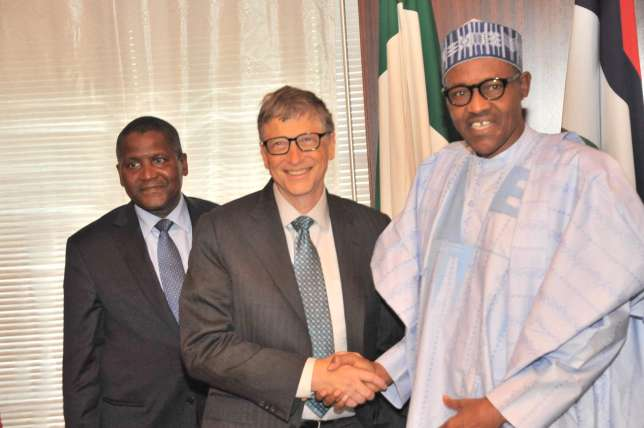Speech by Bill Gates at the National Economic Council, Aso Rock Presidential Villa, Abuja.
Your Excellency Muhamadu Buhari, President of the Federal Republic of Nigeria; Professor Yemi Osinbajo, Vice President of the Federal Republic of Nigeria; Senator Bukola Saraki, Senate President; Honorable Yakubu Dogara, Speaker of the House; Your Excellencies, executive governors of the Federal Republic of Nigeria; Royal fathers; Distinguished ladies and gentlemen; and as you say in Nigeria, all other protocols observed.
Thank you for welcoming me to Nigeria. I’ve been coming here regularly since 2006, and I’ve always felt welcome. Nigerians usually greet me warmly. The first time I met the Sultan of Sokoto, I was honored that he greeted me with the gift of a white horse.
At some point during every visit, though, some brave person eventually asks me—very politely—“Why are you actually here?” It’s an understandable question.
Most American technology guys don’t wander around Nigeria learning about its health system. But I think I have a good answer.
When we started Microsoft 40 years ago, we wanted to build a successful business, but we also wanted to make people’s lives better. We believed computers could revolutionize the way people lived and worked. But back then only big companies could afford them. We wanted to give everybody access.
As I got older, traveled more, and learned more about the world, I realized that billions of people had a problem that computers couldn’t solve. They lacked the basics of a good life: food, shelter, health, education, and opportunity.
And so I started my second career with my wife Melinda. With the money I’d been lucky enough to earn at Microsoft, we started working toward a different goal: a healthy and productive life for everyone.
That’s why I come to Nigeria, and that’s why Melinda and I will continue coming for as long as we are able. Our foundation’s biggest office in Africa is here. We have committed over $1.6 billion in Nigeria so far, and we plan to increase our commitment.
We have strong relationships with the federal government, state governments, businesses, NGOs, and civil society organizations. We are eager to support you as you work to make Nigeria a global economic powerhouse that provides opportunity for all its citizens—as you strive fulfill this country’s immense promise.
I’m blown away by how much Nigeria has changed in the past decade. Consider the technology sector. That energy I talked about during the early days of Microsoft, our passion and our eagerness to take risks…. That’s the same energy that powers technology hubs across Nigeria like Co-Creation and Enspire.
The novelist Chimamanda Adichie, who my wife especially admires, captured the country’s spirit when she said her fellow Nigerians have “big dreams and big ambitions.”
This line graph of Nigeria’s per capita GDP shows where those dreams and ambitions can lead. With the exception of the recent recession, the slope goes straight up.
As a result of this growth, Nigeria is now the biggest economy on the continent. You are rapidly approaching upper middle-income status, like Brazil, China, and Mexico.
But growth is not inevitable. Nigeria has unmatched economic potential, but what becomes of that potential depends on the choices you make as Nigeria’s leaders.
The most important choice you can make is to maximize your greatest resource, the Nigerian people. Nigeria will thrive when every Nigerian is able to thrive.
If you invest in their health, education, and opportunities—the “human capital” we are talking about today—then they will lay the foundation for sustained prosperity. If you don’t, however, then it is very important to recognize that there will be a sharp limit on how much the country can grow.
You see this risk in the data. From the point of view of the quality of life, much of Nigeria still looks like a low-income country. Let me give a few examples.
In upper middle-income countries, the average life expectancy is 75 years. In lower middle-income countries, it’s 68. In low-income countries, it’s 62. In Nigeria, it is lower still: just 53 years.
Nigeria is one of the most dangerous places in the world to give birth, with the fourth worst maternal mortality rate in the world, ahead of only Sierra Leone, Central African Republic, and Chad.
One in three Nigerian children is chronically malnourished.
I do not enjoy speaking to you this bluntly when you have been gracious enough to invite me here. But I am applying an important lesson I learned from Alhaji Aliko Dangote. Recently, Aliko and I were having a conversation with several governors about their states’ official immunization rates.
Aliko’s way of stressing the importance of accurate data was to tell us, “I didn’t get rich by pretending to sell bags of cement I didn’t have.”
I took from that that while it may be easier to be polite, it’s more important to face facts so that you can make progress.
On immunization, you are already living that lesson: last year Nigeria revised its immunization coverage numbers downward to reflect more accurate sources, and I applaud you for those lower numbers. They may look worse, but they are more real, which is the first step toward saving and improving more lives.
I urge you to apply this thinking to all your investments in your people. The Nigerian government’s Economic Recovery and Growth Plan identifies “investing in our people” as one of three “strategic objectives.” But the “execution priorities” don’t fully reflect people’s needs, prioritizing physical capital over human capital.
To anchor the economy over the long term, investments in infrastructure and competitiveness must go hand in hand with investments in people. People without roads, ports, and factories can’t flourish. And roads, ports, and factories without skilled workers to build and manage them can’t sustain an economy.
In preparation for my visit, I asked a research institute at the University of Washington to model Nigeria’s economic growth under three scenarios related to health and education, the core of how economists define human capital.
Here you can see Nigeria’s per capita GDP growth from 2000 until today. If current education and health trends continue—if you spend the same amount in these areas and get the same results—per capita GDP flat lines, with economic growth just barely keeping up with population growth.
If things get worse, it will decline. Unfortunately, this scenario is a very real possibility unless you intervene at both the federal and state levels. Because even in the worst-case scenario, your national income level is about to make you ineligible for certain kinds of development assistance and loans that you’ve been relying on to fund your health system and other priorities.
Without more and better spent domestic money, investment in your people will decline by default as donor money shrinks—a lose-lose scenario for everyone.
However, if you commit to getting better results in health and education—if you spend more and more effectively—per capita GDP will stay on its remarkable pre-recession trajectory.
This is the scenario we all want: Nigeria thrives because every Nigerian is able to thrive. And the data makes it clear that this scenario is entirely within your reach.
What do I mean by investing in your people? I mean prioritizing health and education, the factors included in the model I just showed you. I also mean continuing to open up opportunities in the agriculture and microenterprise sectors, as the government has proposed in the ERGP. I mean creating the conditions where Nigerians can reach their goals while adding value to the economy—the win-win scenario.
Our foundation doesn’t invest directly in education here, but the World Bank World Development Report that just came out makes it clear that education leads to improvements in employment, productivity, and wages.
Today, though, more than half of rural Nigerian children can’t read and write. The conclusion is inescapable: Nigeria’s economy tomorrow depends on improving its schools today.













